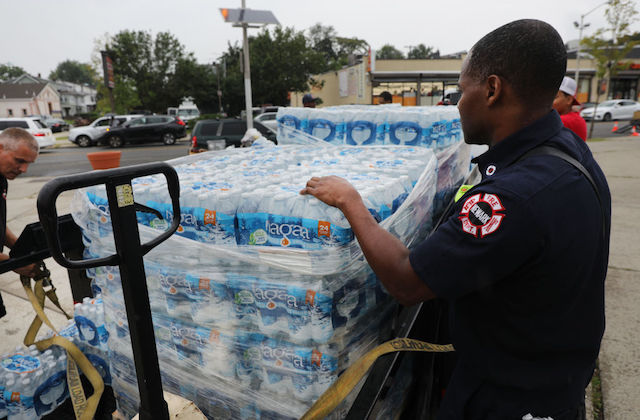Elected officials in Newark, New Jersey, finally had positive news to share about the city’s ongoing water crisis.
On Monday (September 23), Governor Philip D. Murphy and other officials held a press conference to announce that the lead levels in the water coming out of the taps in homes around the city had decreased.
“Testing done jointly by city, state and federal officials found that the filters had been 97 percent effective at reducing lead levels to below a federally acceptable standard, meaning that 97 percent of test results showed the filters working properly,” reports The New York Times. The testing involved more than 1,700 samples from about 300 homes.
“These results are a welcome jolt of positive news that allows us collectively to charge ahead in implementing our short-term, midterm and long-term solutions,” Murphy said at the press conference.
As Colorlines previously reported, for close to two decades, Newark officials have known that the city’s oldest pipes leached lead into the water. The chemical sodium silicate was added to the water and it effectively kept lead out—until 2017 tests of residential water samples showed it had stopped working. Water filters were distributed to 40,000 residents in October 2018, but this August, the United States Environmental Protection Agency (EPA) sent a letter to Newark and New Jersey officials informing them that the filters were not helping and that bottled water should be distributed to residents.
As global attention turned to the majority-Black city’s growing water crisis, the city set an accelerated goal to replace all antiquated lead pipes in less than three years. The initial timeframe was 10 years.
“We are not in any way having a victory lap because this is not a victory lap for us,” Mayor Ras Baraka said at the press conference. “It is good news in a long and arduous task to make sure that we have clean drinking water.”
Environmental activists are cautiously optimistic about the test results. “We say ‘trust, but verify,’” Erik Olson, a senior director at the Natural Resources Defense Council, told The Times. “The city, state and federal Environmental Protection Agency should provide all test results and the protocols used to test the filters to the public so Newark residents can feel confident that filters will protect their health. Anything less than full transparency will breed further distrust and skepticism.”
A complete report on the state of the city’s water will be released in a few weeks, per The Times. Meanwhile, because 3 percent of the tested samples still showed elevated levels of lead, free bottled water is still available for residents who want it.
